
News
Behind the Headlines
Two-Cents Worth
Video of the Week
News Blurbs
Articles
Testimony
Bible Questions
Internet Articles (2015)
Internet Articles (2014)
Internet
Articles (2013)
Internet Articles (2012)
Internet Articles (2011)
Internet Articles (2010)
Internet Articles
(2009)
Internet Articles (2008)
Internet Articles (2007)
Internet Articles (2006)
Internet Articles (2005)
Internet Articles (2004)
Internet Articles (2003)
Internet Articles (2002)
Internet Articles (2001)

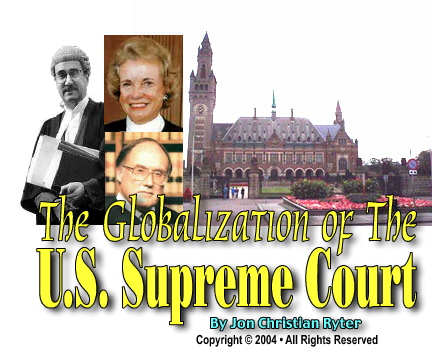
The impending
death from thyroid cancer, or the imminent forced retirement of U.S.
Supreme Court Chief Justice Justice William H. Rehnquist, combined
with the announcement this week by "moderate" Associate
Justice Sandra Day O'Connor—who
has also expressed the desire to retire—of the significant 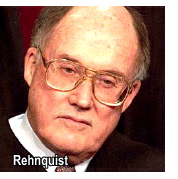 role
that international law will play in the high court's decisions in
the future, greatly raises the stakes in the November 2 election.
role
that international law will play in the high court's decisions in
the future, greatly raises the stakes in the November 2 election.
The move
to globalize decisions of the Supreme Court by introducing international
legal precedents and European case law into federal legal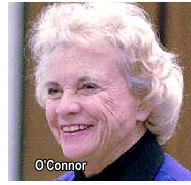 decisions began during the Clinton years.
While hotly resisted by "States rights" judges during the Bush-43 years, internationalizing decisions
of America's high court is seen as the first step in forcing the American
judicial system to become subservient to the World Court in the Hague.
If John Kerry is elected, this will be
one of his first initiatives...a global assault on the American legal
system that will allow US Supreme Court decisions to be appealed to
the World Court in Belgium.
decisions began during the Clinton years.
While hotly resisted by "States rights" judges during the Bush-43 years, internationalizing decisions
of America's high court is seen as the first step in forcing the American
judicial system to become subservient to the World Court in the Hague.
If John Kerry is elected, this will be
one of his first initiatives...a global assault on the American legal
system that will allow US Supreme Court decisions to be appealed to
the World Court in Belgium.
The surprise announcement on Monday, Oct. 25 that US Supreme Court Chief Justice William H. Rehnquist had undergone a tracheotomy for thyroid cancer shocked the nation and raised the stakes of the Bush-Kerry election since whomever is elected President of the United States on November 2 will very likely not only select a new Chief Justice of the US Supreme Court, but will appoint at least two members to the high court, reshaping for at least a decade or two—if not for all time—the philosophical slant of this august body, since once the decisions of the Supreme Court are internationalized and the laws of the European Union are codified into American case law, the change will become permanent since the international code of law will then be incorporated in lower federal court decisions. Trickling downward, liberal attorneys pressing matters in State court will use European Union case law as precedents in arguing local, county or State actions. Ultimately, actions ruled upon by the US Supreme Court will be appealed to the World Court and either upheld or overturned—ending for all time the concepts of national sovereignty.
Rehnquist's thyroid cancer was front page news in the major newspapers in Europe Tuesday since the member states of the EU know that however much the American federal court system becomes "euroized" in the next four years depends entirely on whether John F. Kerry or George W. Bush is elected president—and whether the liberal Democrats in the United States regain control of the US Senate, since the Senate determines what ideological philosophies of judicial nominees are acceptable and which are politically-incorrect. The majority party in the Senate decides which judicial nominees get hearings and which get buried. With a 50-50 Senate that largely shared committee control for the first two years of the Bush-43 Administration—and even with the current 51-49 Senate make-up that gave the GOP control of committee chairs in the US Senate—Bush's conservative judicial nominees, for the most part, never see the light of day, forcing Bush to select more centrist judges that will come closer to passing the liberal litmus test since the current GOP Senate management has not mastered the art of circumventing the Democrats who have successfully placed hurdles before almost every Bush judicial nominee—not because, as they claim, they are afraid those judges will overturn Roe v. Wade, but because conservative or moderate federal judges are generally not social activists and are, thus, much more inclined to render judicial decisions that are based solely on the US Constitution and not the international code of justice based on the common laws of the 17th century Laws of the Nations.
The international media, like the newspapers in the United States, noted that Rehnquist would return to the Supreme Court on November 1—the day before the national election in the United States. Rehnquist, they observed, wanted to make sure he was firmly at the helm of America's high court should the Election of 2004 also end up before that august body.
Rehnquist, 80, is only the second chief justice in US history to have passed his 80th birthday while still on the bench. The British media noted that, even if Rehnquist was too ill to actually preside over the tribunal, he could still listen to the tapes of the legal arguments presented in Kerry v Bush or Bush v Kerry, and participate in the hearing—and even cast the deciding vote as he did in Bush v Gore in 2000. Only the death of the Chief Justice, or his abrupt resignation before November 3 would raise the specter of a 4-4 tie on a Supreme Court hearing over the Election of 2004, and cause whatever appellate decision preceded the high court filing to decide the Election of 2004.
It is unclear if the cancerous thyroid gland in Rehnquist's neck was removed, or if the tracheotomy was performed because the thyroid could not be removed due to the advanced stage of the cancer, or because the tumor pressed against his trachea and the procedure was needed to assist his breathing until the thyroid gland can safely be removed. It is more likely that the gland was not removed since that would have incapacitated Rehnquist beyond November 2, should the Election of 2004 end up in his court.
Rehnquist's condition brought home very clearly the stark differences between two presidential candidates whom most ultraconservative voters believe are twin members of the Yale Skull & Bones fraternity for the wealthiest sons of the world's wealthiest families—all of whom sit on the pinnacle of power. While the Bush family is known for its efforts, since 1945, of working to achieve a system of global governance that would erode the external sovereignty of the nation-state, George W. Bush has done more than any president since Ronald Reagan—including his own father—to strengthen America's sovereignty-rights and to protect the American people beyond our shore; and to restore the rule of law to the federal judicial system that will further protect America's internal and external sovereignty by strengthening, rather than weakening, States rights.
In a 15-minute speech delivered at Georgetown University Law School on Wednesday, October 27, Associate Justice Sandra Day O'Connor described the growing citation of international law in US courts to establish legal precedents that are now shaping legal opinion worldwide. O'Connor noted that, increasingly, the cases taken on by the Supreme Court demand a better understanding of international law and the foreign legal systems. Specifically, she mentioned the detention by the US military of Muslim insurgents being held at Guantanamo Bay, Cuba without due process. (Many of those detainees have since been released. At least five of those whose release was mandated by American federal courts have returned to Afghanistan or Iraq and have rejoined the insurgency and have been responsible for the deaths of Americans since their court-ordered release.) O'Connor told her Georgetown law student audience that "...[i]nternational law is no longer a specialty...It is vital if judges are to faithfully discharge their duties..." Providing, of course, that these judges recognize and acknowledge their sworn obligation to uphold, as primary law, the Constitution of the United States, and affirm they will never subvert the US Constitution to the UN's Declaration of Human Rights or the European Union's updated Laws of the Nations. "Since September 11, 2001," she said, "we're reminded some nations don't have the rule of law or [know] that it's the key to liberty." Many of the judges who don't understand the rule of law—and the constitutional tenets of a republican democracy—are, unfortunately, on State court benches thanks to activist liberal governors like former governors Lawton Chiles [D-FL] and Gray Davis [D-CA], Parris Glendening [D-MD], Jane Shaheen [D-NH], Howard Dean [D-VT], and current governors like John Baldacci [D-ME], Jennifer Granholm [D-MI], James McGreevey [D-NJ] (who has announced his resignation after the election to assure that his job will go to a likeminded liberal),Bill Richardson [D-NM], Brad Henry [D-OK], Edward Rendell [D-PA], Mike Leavitt [R-UT], Mark Warner [D-VA], Gary Locke [D-WA]. Bob Wise [D-WV] (a lame duck governor whose marital infidelities caused him not to seek re-election) and Jim Doyle [D-WI]. Add to that the liberal mindset of the Senate Judiciary Committee that advises and consents on all federal judicial appointments, and it is easy to see the leftward lean of federal court system since US District Court appointments generally come from State court benches, and federal appellate appointments come from the US District Court benches—with a few exceptions. Many times Congressmen, Senators and Attorneys General vie for, and receive, appellate court and Supreme Court nominations from grateful presidents—or as rewards from their national party organizations who successfully lobby the White House on their behalf.
The slant of those appointees, of course, is contingent upon the ideological slant of the man in the White House. While the conservative far right does not see much of a difference between Skull & Bones initiate, Yale grad John Forbes Kerry and Skull & Bones initiate, Yale grad George Walker Bush, there is as much of a ideological chasm between them and, say, night and day, creationism and evolutionism, or more important, globalism and nationalism—since John F. Kerry has already proven, beyond a shadow of doubt, that he is a globalist who would not hesitate to mandate, by presidential decree, an "international test" on the Constitution of the United States—and, thus, on the US Supreme Court. Bush, on the other hand, has steadfastly demonstrated over the past four years—much to the consternation of the European community that wants to regain control of its wayward colonies—that the United States of America has the sovereign right to protect itself from any and all threats—domestic or foreign—with or without the oblations of the European community.
So, the differences between Bush and Kerry are as stark as would be their picks to replace Chief
Justice Rehnquist should the aging jurist succumb to his cancer,
or decide to retire to spend the rest of days in the solitude of .jpg) private
life. The odds are very good that President George W. Bush would
select Associate Justice Clarence Thomas to serve as Chief Justice.
He would not select O'Connor simply because she, herself, wishes
to retire to care for her ailing husband. Nor would he select Anthony
Kennedy, the other moderate on the high court, who votes more often
with the four liberals than he does with the three conservatives. Bush would likely attempt to appoint failed Appellate Court nominee, US District
Court Judge Thomas Pickering to the high court to replace a retiring O'Connor or deceased or retired Rehnquist if the Republicans
can add at least six additional seats in the US Senate to assure that Bush's nominees are not filibustered or buried without a hearing.
private
life. The odds are very good that President George W. Bush would
select Associate Justice Clarence Thomas to serve as Chief Justice.
He would not select O'Connor simply because she, herself, wishes
to retire to care for her ailing husband. Nor would he select Anthony
Kennedy, the other moderate on the high court, who votes more often
with the four liberals than he does with the three conservatives. Bush would likely attempt to appoint failed Appellate Court nominee, US District
Court Judge Thomas Pickering to the high court to replace a retiring O'Connor or deceased or retired Rehnquist if the Republicans
can add at least six additional seats in the US Senate to assure that Bush's nominees are not filibustered or buried without a hearing.
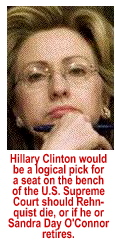 A President John F. Kerry, on the other hand, will move quickly
to reinstate the welfare state, federalize the healthcare system in
the United States and shore up abortion rights—and at the same
time, eliminate the threat to his job in 2008 by offering a berth on
the US Supreme Court to Hillary Rodham Clinton if the Democrats
gain a majority of two or three seats in the Senate—or to Bill
Clinton as a reward for faithful service if the Democrats don't
get a one or two seat advantage in the Senate. Bill Clinton actually has a different job in mind, and is now actively campaigning
A President John F. Kerry, on the other hand, will move quickly
to reinstate the welfare state, federalize the healthcare system in
the United States and shore up abortion rights—and at the same
time, eliminate the threat to his job in 2008 by offering a berth on
the US Supreme Court to Hillary Rodham Clinton if the Democrats
gain a majority of two or three seats in the Senate—or to Bill
Clinton as a reward for faithful service if the Democrats don't
get a one or two seat advantage in the Senate. Bill Clinton actually has a different job in mind, and is now actively campaigning  for
the job as Secretary-general of the UN—which he will likely get
if Bush is re-elected, but won't get if Kerry wins. If
the MoveOn.org-George Soros-financed 527-voter registration
drive produces the 10 million illegal votes which are anticipated by
the DNC, Kerry stands a good chance of not only winning
the election, the Democrats stand a chance of regaining control of the
US Senate and enough seats in the House of Representatives to leverage
voting on key legislation for the next two years (losing the House gains
in the midterm election of 2006). It is unclear if Kerry—with
a Democratically-controlled Senate—would reward Hillary Clinton with the top-slot on the high court although that might be the only
way, prior to 2008,
for
the job as Secretary-general of the UN—which he will likely get
if Bush is re-elected, but won't get if Kerry wins. If
the MoveOn.org-George Soros-financed 527-voter registration
drive produces the 10 million illegal votes which are anticipated by
the DNC, Kerry stands a good chance of not only winning
the election, the Democrats stand a chance of regaining control of the
US Senate and enough seats in the House of Representatives to leverage
voting on key legislation for the next two years (losing the House gains
in the midterm election of 2006). It is unclear if Kerry—with
a Democratically-controlled Senate—would reward Hillary Clinton with the top-slot on the high court although that might be the only
way, prior to 2008,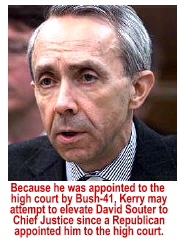 that she would accept the position. Such an offer would likely be made
to Bill Clinton first if the Senate remains in the hands of the
GOP (since it is not likely that a Republican-controlled Senate would
agree to elevate Stephen Breyer, John Paul Stevens or Ruth Bader Ginsberg to the job of Chief Justice—or appoint Hillary Clinton to the high court in any capacity). Kerry would, however, elevate David Souter as a "compromise candidate"
since the ultra-liberal Souter was nominated to the high court
by George H.W. Bush. He would likely be seen as an acceptable
candidate by the Senate Judiciary Committee headed by Orrin
Hatch [RUT]. It would require a Democratic led Senate Judiciary
Committee to get any traction for a Hillary Rodham Clinton nomination. Bill Clinton's nomination, on the other hand, would fly through
the Senate in a bipartisan manner seldom seen on Capitol Hill with Republicans
like Hatch and Arlen Specter [R-PA] who have, in the past,
denounced Clinton as a liberal in sheep's clothing, fondly referring
to the former president as a moderate who would bring balance and sanity
to the high court.
that she would accept the position. Such an offer would likely be made
to Bill Clinton first if the Senate remains in the hands of the
GOP (since it is not likely that a Republican-controlled Senate would
agree to elevate Stephen Breyer, John Paul Stevens or Ruth Bader Ginsberg to the job of Chief Justice—or appoint Hillary Clinton to the high court in any capacity). Kerry would, however, elevate David Souter as a "compromise candidate"
since the ultra-liberal Souter was nominated to the high court
by George H.W. Bush. He would likely be seen as an acceptable
candidate by the Senate Judiciary Committee headed by Orrin
Hatch [RUT]. It would require a Democratic led Senate Judiciary
Committee to get any traction for a Hillary Rodham Clinton nomination. Bill Clinton's nomination, on the other hand, would fly through
the Senate in a bipartisan manner seldom seen on Capitol Hill with Republicans
like Hatch and Arlen Specter [R-PA] who have, in the past,
denounced Clinton as a liberal in sheep's clothing, fondly referring
to the former president as a moderate who would bring balance and sanity
to the high court.

Copyright © 2009 Jon Christian Ryter.
All rights reserved.


